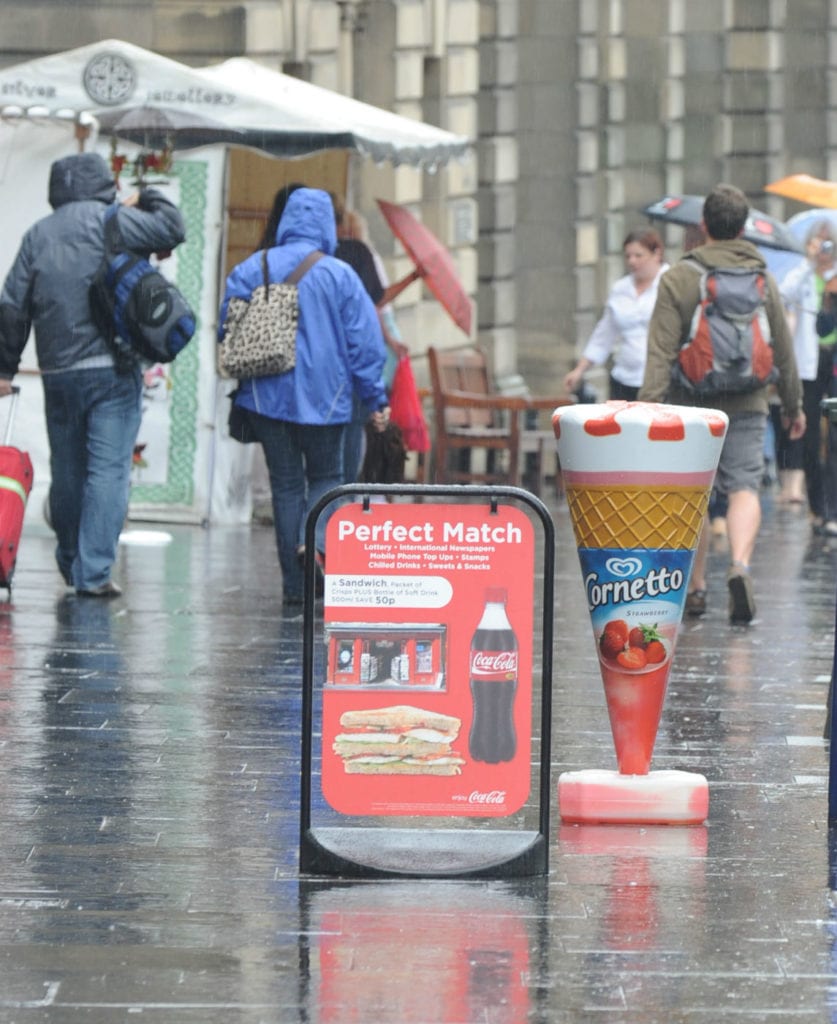The ban, which was approved by members of the Transport and Environment Committee in May, includes all temporary advertising structures, such as advertising boards (known as A-boards), came into force on Monday (5 November).
The council say it aims to create safer, more accessible streets, particularly for those with disabilities such as sight impairments and mobility difficulties.
Businesses across the capital were contacted last month with further information on the change, advising that on-street advertising should be removed by midnight on 4 November.
Initially, environmental wardens will visit businesses around the city to ensure awareness and maximise compliance with the ban, with the first step being a verbal warning.
Should any businesses ignore this first step and continue to use advertising on the street, they will be contacted in writing, continued offending will lead to the A-board being removed by the council and the business being billed for the costs.
Those who continue past this point will be reported to the Procurator Fiscal and could face fines of up to £200.

The ban affects any kind of temporary on street advertising structures. Picture: TSPL
Owner of Monty's bar on Morrison street, James MacDougall, believes the ban is a waste of time and will only hurt small businesses, he said: "I have a very slim line A-board that I do put out in front of my bar, it has a few bits of information on it that folk read all the time. It's about the same width as the electrical box that sits on the other side of the door. So people usually have to walk around it anyway.
"During the last 6 Nations, I got one of my members of staff to write something in French on my A-board - for four days they were coming in because of our sign.
"Yet again they [the council] are trying to hurt small businesses, while they cut down 53 trees in Princess Street Gardens to make way for more pop up Christmas shops.
"If it's truly about decluttering our walkways then these things should be the first to go."
Justin Davis from Edinburgh Pub Crawl, asked for help to be given to businesses, and in particular, walking tours, he said: “Whilst we recognise the city wants to remove all the temporary advertising, we want to consider that you are absolutely sure when it happens, it does not harm businesses.
“We have been doing walking tours for about eight years and have always had some kind of signage on the Royal Mile. Without a signage board of any kind, we miss out on that market entirely.”
He added: “We understand the importance of removing the boards - it’s becoming a bit of a free-for-all.
“We just ask that in the interest of fairness that new companies get the same opportunities to companies that have been there a while.”
Amongst feedback to the original proposal, the council said that it was recognised that the city’s pavements should be as safe and accessible as possible, and that minimising temporary on-street advertising would make a "significant contribution toward achieving this".
Transport and environment convener, Councillor Lesley Macinnes, said the ban is "ultimately about opening up" the city's streets for all members of society, "creating welcoming, clutter-free spaces where people can move freely", she said: “We’ve heard from lots of different groups about the mobility issues caused by the presence of temporary, moveable structures such as advertising boards, so it’s clear that action needs to be taken if we are to live in a truly equal, accessible city.
READ MORE: Capital recruits the A-Team for advertising board purge
“As we approach the implementation of the ban, we’ve written to all businesses to ensure they have the relevant information, and in the coming months our wardens will be visiting shops, cafes, restaurants and other premises to offer advice and guidance on alternative advertising options.”
The Council’s decision in May to enforce a citywide ban follows a period of public consultation and engagement with stakeholders, including Living Streets, Royal National Institute of Blind People (RNIB) and the Edinburgh Access Panel, along with various traders’ associations, Business Improvement Districts (BIDs) and community councils.
A spokesperson for RNIB Scotland said: "We very much welcome this move by the City of Edinburgh Council to help make the streets of the capital more accessible to visually impaired people.
"A vital element for any successful 21st century city must be inclusivity. A city that is open and welcoming to everyone, residents and visitors, no matter what needs or disabilities they may have. This move is a big step in that direction."
David Spaven, convenor of Living Streets Edinburgh Group, said: “Many Edinburgh pavements have become obstacle courses in recent years, and removing advertising boards will make it much easier to get around comfortably and safely on foot and in wheelchairs.
"Clutter-free streets will be more attractive and will help to make Edinburgh a more walkable city – and that’s in everyone’s interests.”
To further support businesses with the change, a webpage has been set up, including guidance on different types of advertising and business promotion.
